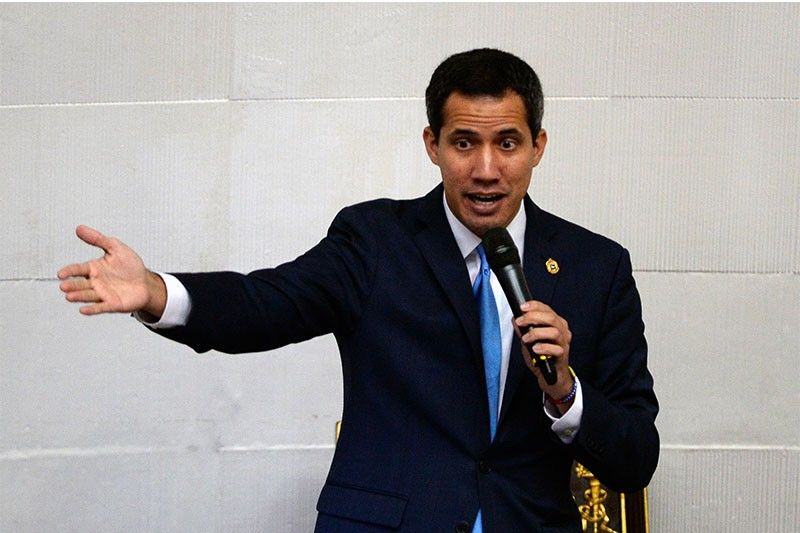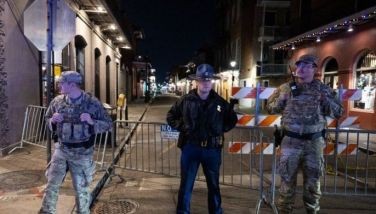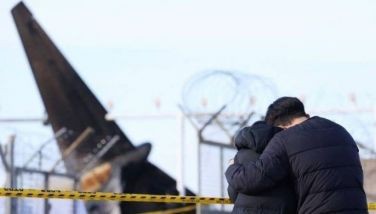Venezuela parliament ratifies Guaido as interim president

CARACAS, Venezuela, — Venezuela's opposition-dominated National Assembly on Tuesday ratified Juan Guaido as the country's interim president until new elections can be held.
The endorsement came a day after the government of President Nicolas Maduro said its lawmakers would return to the legislature, which they abandoned three years ago.
The vote represented "unrestricted political support for the leadership of Juan Guaido as president of the National Assembly and as president in charge... until the cessation of usurpation occurs," according to a statement from the National Assembly.
The decision implies that US-backed Guaido, recognized as interim president by more than 50 countries, will continue to head the legislature after January 5 when his term ends.
The United States welcomed the move, saying it reflected "the unity and strength of the democratic opposition."
Deputies from the ruling socialist party walked out of the National Assembly in 2016 after losing control in elections, and the government set up its own body, the Constituent Assembly, to sideline the opposition-dominated body.
On Monday, Maduro's government said its deputies would return to the National Assembly "in the interest of deepening and extending the dialogue" with the opposition.
That announcement came hours after Guaido announced that talks aimed at resolving the country's long-running political had ended.
Maduro called off the talks, which were initially held in Oslo and then moved to Barbados, on August 7 in response to US sanctions against his government.
"After more than 40 days during which he refused to continue, we can confirm that the Barbados (dialogue) mechanism has ended," Guaido said.
Guaido earlier this year declared himself interim president with the backing of the United States and other western powers, saying elections that returned Maduro to power had been undermined by fraud.
The presidency of the National Assembly normally rotates annually under an agreement within the opposition coalition.
The position would next fall to minority movements within the opposition, including parties who have signed a pact with Maduro paving the way for a return of his socialist party to the legislature.
Venezuelan President Nicolas Maduro accuses Colombia of being behind an "attack" with an explosive-laden drone he said targeted him on Saturday (Sunday, Manila time).
Speaking shortly after state television showed him cut off mid-speech in front of a Caracas military parade by a bang, Maduro says a "flying object exploded in front of me" and blamed the incident on Colombia's President Juan Manuel Santos.
"It was an attack to kill me, they tried to assassinate me today," Maduro says in a state broadcast. "I have no doubt that the name Juan Manuel Santos is behind this attack." — AFP
The government of Nicolas Maduro and the Venezuelan opposition broke a political stalemate Saturday with a broad social accord, and the US government responded by allowing a major US oil company to resume operations in Venezuela.
The accord heralded a potential easing of a grinding economic and political crisis in Venezuela.
It paves the way for the United Nations to oversee a trust fund of frozen assets of the Maduro government to be used for a variety of social projects in the South American country, including programs related to education, health, food security, flood response and electricity.
"We have identified a set of resources belonging to the Venezuelan state, frozen in the global financial system, to which it is possible to access," said Dag Nylander, an envoy from Norway, which facilitated the negotiations. The amount to be released was not specified.
The agreement, signed in Mexico, ended 15 months of stalemate between the two sides, potentially easing a massive flow of refugees from Venezuela throughout the region and even impacting world oil markets.
Maduro praised the deal on Twitter, saying it "opens the way for a new chapter for Venezuela, to keep advancing towards the peace and well-being that all Venezuelans yearn for." — AFP
A US delegation arrived in Venezuela Monday to discuss a "bilateral agenda," extending discussions between Caracas and Washington initiated in March, said Venezuelan President Nicolas Maduro.
National Assembly speaker, Jorge Rodriguez, "is receiving a delegation from the government of the United States, an important delegation that arrived two hours ago in Venezuela," Maduro announced on national public television VTV at around 8:00 pm (0000 GMT).
Rodriguez is also the Venezuelan government's negotiator in talks with the opposition, which have been at a standstill since last October.
Washington had sent a high-level delegation to Caracas in early March, a few days after Russia invaded Ukraine. Several observers said the move was aimed at trying to distance Caracas from one of its main allies, Moscow, and discussing an easing of US sanctions on Venezuelan oil after the invasion caused a spike in global fuel prices.
The White House confirmed the meeting but only said the discussions had focused in particular on American "energy security." Before its rupture with Washington, Venezuela exported almost all of its oil production to the United States.
After those discussions, Caracas released two Americans detained in Venezuela in what was widely seen as a goodwill gesture.
In May, Washington announced it would ease some limited sanctions against Venezuela, including one linked to the oil company Chevron, to promote dialogue between Maduro's government and the opposition. -- AFP
The International Criminal Court has opened an office in Venezuela as part of an investigation into alleged human rights abuses during anti-government protests in 2017, authorities announced on Thursday.
The ICC opened a formal investigation into the alleged rights violations last November and signed a memorandum of understanding with Venezuelan President Nicolas Maduro which stated that the South American country would take "measures" to ensure the court would be able to work.
"It's a very important step, very significant. This is not for appearance's sake, it is something concrete that will allow me to carry out my responsibilities," said ICC prosecutor Karim Khan alongside Maduro at the presidential palace in Caracas.
"Venezuela will now have this office that will provide us with an effective level of dialogue in real time that is more efficient," said Maduro, who has been in power since 2013. — AFP
President Nicolas Maduro says that EU monitors of Venezuelan local elections were "enemies" and "spies," denying their assertion that last week's voting was marred by irregularities.
"Those who came as enemies, the delegation of spies from the European Union, found not a bit of evidence to criticize the electoral system," Maduro says of the November 21 vote for gubernatorial and mayoral posts.
Candidates that back the Maduro government were declared the winners in the vast majority of the races. — AFP
Venezuela's opposition calls on President Nicolas Maduro's government to resume talks to resolve their differences, after the ruling party withdrew from the latest round that was to begin Sunday in Mexico.
"We urge the other side to resume the sessions in Mexico as soon as possible to produce the necessary agreements," Gerardo Blyde, head of the opposition team, says at a press conference in Mexico City.
The meeting was to run until Wednesday. — AFP
- Latest
- Trending





























